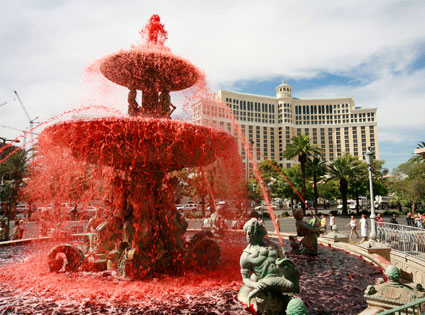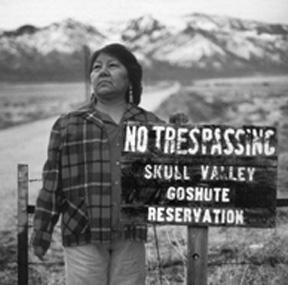
In the biased view of this blogger, I see being Westernised as a form of making the best of a bad situation. And maybe not even the best. What titles like make me think about is how Western or Westernised press always want to promote "the West" as inherently better than "the East" which is infused with the corrupt idea that whiteness is better than non-whiteness. The West insistently prides and promotes itself as being "the best the world has to offer" while it also makes it a daily practice to murder people of color and rape women of all colors. Is that really anything to be proud of? Decades of warfare against people of color across my country, across many regions of Asia and Central America? The Maafa and enslavement of West Africans throughout the Americas? The savage slaughter of Indigenous North Americans? European and U.S. witch burning? Apartheid in Israel? This is cause for celebration? Invasion and sexual slavery and destruction of the environment in which so many beings live? Pride? Really?
Of what does the West and North feel ashamed? Auschwitz-Birkenau and German complacency in the face of anti-Semitism? Maybe. Although the members of burgeoning neo-Nazi movements don't look ashamed to me.
The answer is that the West is defined, in part, by its capacity to commit all manner of atrocity without publicly declaring shame or regret or remorse, or even, a desire to end the evil ways that allow the West to thrive. And this is the point: the West and Global North cannot survive without stigmatising and stereotyping, demonising and demolishing the East, the Global South, and exploiting the people and land that is in these rather vast regions of the world.
I will tell you this: from a pro-Indigenist point of view, the West is the worst the world has to offer. The West means wealth concentrated into the bloody hands of the few, at the expense of everyone and everything else. Surely the news of what the West's military, financial institutions, BP, Chevron, and other major Western corporations do and have done to people and the land and sea is proof enough. Isn't it? And, if that isn't enough, pray tell, what would be?
I can hear the chorus of West/North-defenders. But you know the burning of women happens in the East too!! Yes, recently. Genocide happens in the Global South too!!! Yes, but not of 75 to 90 million people in North America alone, leaving out the rest of the Americas and everywhere else. How many millions of Indigenous people do you imagine the West and Global North has murdered, sum total? 200 million? 300 million?
"But those husbands in those non-Western places are so cruel to their wives", the chorus chimes in. This happens, yes. And husbands' and boyfriends' battery of women in the West is epidemic. What moral ethic do we use to measure our greatness based on our selective atrocity-highlighting in places where we are not? Do you know the stories of people in the East and Global South pre-industrialisation? Pre-capitalism? Pre-invasion?
Now the chorus includes my friends and family: but you are turning pre-capitalist Indigenous society into a romantic notion, free of all evil and horror?!
No, I'm not. I'm saying that the argument "They do bad things too" isn't a moral position worth a damn. I'm saying that before the West and Global North committed its atrocities against those regions of the world, the people enslaved and slaughtered in the process were better off than before being enslaved and slaughtered. This is not a complicated thought or ethic. I'm saying that the Wicked White West and Genocidal Global North steals the resources of the world, hoarding them, abusing every process for obtaining them, so that the West and Global North then become destination areas because the wealth is there, is not something to be proud of. Our collective Western and Northern flags should hang permanently at half-staff, in shame. And let the blood we let out of the veins and arteries of those we slaughtered to erect those flags drip that blood as from a fountain, and let us declare our pride in the light of that blood.
What follows is a story of two cousins, from India, surviving in Israel. It is being cross-posted from
here, at
The Jerusalem Post.
Making the best of a bad situation
By MYA GUARNIERI
05/28/2010 22:34
Female foreign workers absorbing Western ideas.
Like many of
Israel’s migrant laborers, Usha, 26, lives with exploitation. Hired as a caretaker, she is used as a full-time servant instead. “I take care of seven people and a baby,” she says. “I
clean the house. I take the kids to
school.” Her employer’s demands are unreasonable, impossible. Once he forced her to clean the same bathroom three times in one day. “Three times,” Usha repeats with a sigh. Occasionally, he takes her to his business in Ramat Gan and has her work there, too.
Usha, from India, worries that she’ll lose her visa or end up with an employer who doesn’t pay at all. So she stays. She has complained to her employer about her workload and has asked him to up her salary. He has refused.
“Rich people [are] very stingy,” Usha says, wagging her finger in the air as though she were scolding her employer. She laughs and her cousin, Gita, 24, joins in.
It’s a Saturday night in Levinsky Park. The two relax in the grass, Usha wearing Western clothes; Gita wrapped in a lime-green sari. Despite their different dress, the cousins are working toward a common goal – independence. Both hope to avoid an arranged marriage, they explain. They want to do things on their own terms.
Pooling the money they’ve made here, Usha and Gita – who says her elderly employer is “like a mother” to her – have bought land outside their native Delhi. With two years to go on their 63-month visas, they’ll have enough to build a modest home when they return. There, they’ll live alone.
Usha and Gita give each other high-fives and break into laughter again.
I’m uncomfortable with their giddiness, and unsure of how to respond. Usha’s employer is violating her rights. The system – affluent Westerners snatching cheap labor from the East –is inherently exploitative and is set up against them. In Israel, foreign workers are subject to policies that violate their very humanity. Why are they laughing?
The interview is odd in other ways. I’ve spoken with hundreds of Israel’s foreign workers and I’ve yet to meet a woman who says, unabashedly, that she is here for herself, and only herself.
A tremendous majority of migrant laborers, male and female, go overseas to support their families, sending most of their wages home every month. Annual remittances to the Philippines, where many of Israel’s foreign workers come from, are over 15 billion US dollars.
Filipinos regard Overseas Foreign Workers (OFWs) as national heroes. At Manila Ninoy Aquino International Airport, OFWs get their own line at passport control, breezing through like diplomats.
Some migrant laborers tell me that they send most of their earnings to their families and set a little aside for their future. A small handful of men – young, unmarried – concede that they send little or nothing home and save strictly for themselves.
But Usha and Gita are the first women to say this. And I’ve never heard anyone make light of exploitative conditions.
Suddenly, I understand. They’re making the best of a bad situation. They joke about Usha’s “stingy” employer just like they scrape together the money to buy their own home. They work within the system so they can step out of it.
Usha and Gita force me to reconsider female migrant laborers. Are other women living a quiet rebellion? Is it a lonely fight, or do they support each other? And what does their strength, individual or collective, mean for Israel’s community of foreign workers?
Israel’s 300,000 foreign workers face a host of problems. Labor laws are violated on a whim as employers overwork their employees, as in Usha’s case, pay less than the minimum, or withhold wages altogether. A government policy known as the binding arrangement ties a caretaker’s legal status to his or her employer – creating a situation critics, including the Israeli Supreme Court, have likened to modern-day slavery. And heavy debt – loans ranging anywhere from $5,000-$20,000 – taken to pay the employment agencies that arrange for work in Israel keep them stuck, frightened to leave even the worst conditions.
Women, who make up a majority of migrant laborers, face additional difficulties.
Joyce, a 26-year-old caretaker from the Philippines who holds a degree in physical therapy, was pregnant with her first child when she arrived in Israel. When her baby boy was born, Joyce was forced to put him on a plane and send him to the Philippines.
In Israel, pregnancy means a foreign worker must choose between her visa and her baby. If Israeli authorities discover that a migrant laborer has given birth here, she automatically loses her legal status. Critics say this policy violates the human right to having a family.
There are other problems – women working in private homes as caretakers or domestic helpers are vulnerable to sexual exploitation.
Yael Meir, a community worker at Mesila Aid and Information Center for the Foreign Community, remarks that many migrant laborers don’t know their legal rights. When they do, cultural differences sometimes work against the women, most of who come from the Philippines, Nepal, India and Sri Lanka.
“In order to survive in Western society, they have to become a little Western,” Meir says. “They have to learn to stand up for their rights.”
Mesila, which is operated and partially funded by the Tel Aviv municipality, helps by offering “empowerment courses,” lectures that advise on workers’ rights and employers’ obligations. The organization also fosters social networks, Meir says, “to make the community stronger so they can help themselves.”
In the past, Mesila brought together a group of Nepali women who continue to meet on their own. Sri Lankan and Indian women’s groups are on the horizon.
Now Mesila is facilitating a “moms’ committee” made up primarily of single mothers from the Philippines. Most lost their visas when they gave birth, but continued working illegally as domestic helpers. These women are under a tremendous amount of stress, Meir explains. “It is very hard for them, raising a child by themselves, sending money to their families.”
Amid Israel’s crackdown on illegal residents, which began in July 2009, the pressure is only getting higher.
After the government published ads threatening to prosecute anyone caught employing workers sans visas, some of the women were fired from their jobs.
“Now they’re waiting for the [government’s] decision on the children,” Meir says, referring to the state’s plans to deport 1,200 Israeli-born children along with their parents, illegal residents.
The mothers’ committee organizes activities for their children, lending the kids’ lives a  much-needed sense of normalcy and allowing the women to assume leadership roles. Mesila’s groups also provide an outlet, a place for women to discuss their troubles, share their feelings, and find support.
much-needed sense of normalcy and allowing the women to assume leadership roles. Mesila’s groups also provide an outlet, a place for women to discuss their troubles, share their feelings, and find support.
“Part of the reason it is hard for the women to leave and go back home is that they get empowered here,” Meir comments. “[This] puts them in conflict with their eastern values.” Dr. Liat Ayalon, a senior lecturer at Bar-Ilan University’s School of Social Work, points out that this conflict starts long before they leave Israel. Working as caretakers, nannies, or domestic helpers reinforces “traditional gender roles,” Ayalon says. “At the same time, the encounter with Western society and the NGOs encourages them to empower [themselves]. They’re being told that’s the better way to do things.”
And they might be answering to someone on the other end of the phone line. Ayalon recalls that when she was helping create Filipino and Nepali empowerment groups, many of the women said they needed to get permission from their husbands to participate.
“Their exposure to these Western ideas is not doing them a good service. We ask them to come and stand up for their rights and they still have a husband who wants them to do what he wants,” Ayalon says.
“I’m sure if they get the message too strongly and become too independent, it becomes impossible for them to go back.”
But Dr. Malini Johar Schueller, a professor at the University of Florida’s Department of English and author of the book Locating Race: Global Sites of Post-Colonial Citizenship, which challenges myths of globalization, warns against indulging in the idea that women from the East are liberated by their time in the West.
Speaking to Metro, Schueller comments: “It’s a dangerous trope to have.” And to illustrate her point, she offers Iraq and Afghanistan as an extreme example.
“The feminist rhetoric of liberating women was used as a justification for [the United States’] war and continued occupation [of Iraq and Afghanistan].” This line of reasoning, she says, is similar to the British colonial idea of “the white man saving brown women from brown men.”
Further, it does a disservice to women in the West.
“[The idea] that feminism is coming from the West and that an arranged marriage is a bad thing suggests that women in the West aren’t suppressed.” Schueller, who was born in Pakistan and was once a citizen of India, adds, “In the same breath, it’s important to acknowledge organizations [like Mesila].” But it is equally, if not more, important to consider how women empower themselves.
“There are indigenous women’s organizations that few people talk about,” Schueller says, returning to the example of Afghanistan and pointing to the Revolutionary Association of the Women of Afghanistan (RAWA), an independent women’s organization focused on human rights. Despite the fact that RAWA has opened hundreds of clandestine schools for female students, it is strikingly underrepresented in public discourse.
“This ignores what people can do on their own,” Schueller says.
A Saturday evening spent at a Tel Aviv auditorium reminds me of the strength of Israel’s Filipinos. “A Night to Remember” was filled with performances by the youngest members of the community, from high-school-aged to just old enough to hold a microphone.
There was a wide variety of talent on display. One boy teetered along on a unicycle. A teenage gymnast flipped past. A high school girl played the violin. Several groups did energetic, choreographed dance numbers.
Many of the participants were part of the 1,200 who are slated for deportation. The show, supported by the Filipino organization KAMPI and sponsored by the Western Union amongst others, was organized by the parents, illegal residents who may be expelled along with their children.
This is the second such show the Filipino community has put on this year.
No, they’re not consciousness-raising groups. But as the kids on the stage beamed before a cheering audience – a full and rowdy house – I understood how important it was for them to take to the stage and strut their stuff. Performing gives them a sense of pride, a feeling of accomplishment. And their parents, many of whom are single mothers, are empowered by providing them with the opportunity.
Israel’s women pastors, migrant laborers who minister to the foreign workers, offer another example.
The last major expulsion of illegal residents, which came in 2002 and 2003, targeted men. If husbands were deported, the thinking went, wives and children would follow. The assumption seems to have been that men form the backbone of the community.
But when the men, pastors included, were sent home, women rose to replace them.
Ruby Austria, a Filipina pastor, estimates that today women lead half of the churches frequented by migrant laborers. She and another Filipina pastor comment that, in the Philippines, it’s not uncommon for women to take on leadership roles. Why should it be different in Israel?
But, in some cases, it’s Israel’s differences that give women the room to push boundaries.
Ria is a 27-year-old caretaker from India, where dating before marriage is not the norm. On a Saturday afternoon, she walks around South Tel Aviv with both a pink salwar kameez and a boyfriend she met here in Israel. As she uses a payphone to call his family in India, she laughs and says, “We’ll have to marry when we return.”
For some women, working overseas allows them to continue to assert the independence they first fought for at home.
Take Sofia, a 26-year-old Nepali woman who asked to be identified by a pseudonym. When Sofia was 16, she entered into an arranged marriage with a man twice her age.
“I was like a child,” she recalls. “I didn’t know what love is, I didn’t learn about sex.” Her husband “wanted too much sex,” she says. When she wasn’t willing, he raped her.
Sofia also describes a life of servitude. She took care of their child, did all of the housework, and cooked and cleaned for her in-laws. Her married life was “torture,” she says.
After five years, and with the support of her family, Sofia left her husband. She decided to work overseas to secure a better future for herself and her eight-year-old son, who now lives with her parents.
“I feel free because I feel I am independent here,” says Sofia, who lives in an apartment in Tel Aviv with six other Nepali women. “But work feels like a prison,” she adds.












